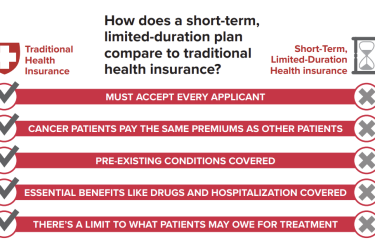
If Senate Republicans were hoping that this week’s new CBO score of their revamped House health bill was going to make life easier for them … Not so much.
House leaders had worked hard to revise American Health Care Act when they couldn’t get the votes. But the Congressional Budget Office found that the projected impact of the amended version, which narrowly passed the House in early May, wasn’t all that different than the original.
The old bill would have led to 24 million fewer Americans having coverage in a decade. The new bill, according to CBO, would mean 23 million would not be covered. It is important to note that some people would remain uninsured by choice once the employer and individual mandates were eliminated.But some would be priced out of the market with less generous subsidies, particularly older Americans who could be charged five times more than younger ones.
Overall, 51 million people under age 65 would be uninsured 10 years from now — almost twice as many as the 28 million who would have lacked coverage under the Affordable Care Act.
Under both versions, Medicaid enrollment would drop by 14 million. Medicaid spending would drop by $834 billion over a decade (That’s in addition to the $600 billion in cuts proposed in President Trump’s fiscal 2018 budget – proposed cuts of historic proportions.)
The new version of the “repeal and replace bill” costs more – savings drop to $119 billion for 2017-26, $32 billion less than the earlier version.
The budget agency dismissed the “death spiral” scenarios for collapsing insurance markets in much of the country and foresaw stable markets by and large. But a not-insignificant one-in-six Americans would live in an area with unstable insurance markets – meaning sicker people could have trouble finding coverage.
Premiums are a little complicated. They’d rise pretty sharply in 2018 (an election year for the House and Senate) and less in 2019. But in 2020, because states would have waiver options to get out of key ACA provisions, including community rating and essential health benefits, there are a bunch of different scenarios. In states that opted out, premiums would drop about 20 percent – and that’s the finding that some conservative backers of the law seized on.
“While there might be disagreements about the coverage effects of state waivers, it is clear that there are meaningful premium reductions from allowing states to pursue them,” Heritage Foundation analyst Drew Gonshorowsky wrote.
But lower premiums don’t always mean lower costs. People could have larger out-of-pocket expenses, such as deductibles, to make the premiums more affordable.
Politically, this does not make things easier for the Senate – although it probably does strengthen the hands of more moderate Republicans who want to revise the House bill significantly. But there’s only so far the moderates can go without losing more conservative members, such as Mike Lee of Utah, Ted Cruz of Texas, and Rand Paul of Kentucky. There are 52 Republicans in the Senate, so passing a repeal bill without any Democratic support means they can’t lose more than two members of their caucus. Plus, they can’t stray so far that the bill is unacceptable to the House.
So be prepared for a long, hot – but interesting – health care summer.








